|
|
|
Sort Order |
|
|
|
Items / Page
|
|
|
|
|
|
|
| Srl | Item |
| 1 |
ID:
192487
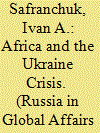

|
|
|
|
|
| Summary/Abstract |
The scale and global consequences of the Ukraine crisis do not allow even
countries that are not directly involved in the standoff to ignore it. Most
members of the international system have to respond to the current events
and formulate their position on the conflict. When analyzing these positions,
the epistemic community tries to explain what stands behind different
reactions to the crisis. The focus of academic work varies from the attitude
of a single country to cross-country comparisons. This paper, pertaining to
the latter category, presents a coordinate system to map the international
reaction to the Ukraine crisis, with special attention to African states. Using
the methods of cluster, correlation, and regression analyses, the authors
present an overall picture of the international reaction to the crisis over
time and highlight factors that can influence the positions of states. The
results show that the positions of African states cannot be easily explained
by material factors, but are rather the consequence of political choice, and
hence are subject to change. African states gravitate towards a neutral
position to stay equidistant from both sides in the confrontation. The
authors conclude that assertive attempts by the great powers to persuade
African states to solidarize with their positions may prove abortive.
|
|
|
|
|
|
|
|
|
|
|
|
|
|
|
|
| 2 |
ID:
192480


|
|
|
|
|
| Summary/Abstract |
This article postulates that the ideological factor is regaining significance
in today’s multipolar world (summit of democracies, discourse on traditional
values) and promotes the importance of an ideological and value dialogue
between right-wing conservative forces in Russia (as major proponents of
conservatism) and right-wing forces in Europe.
The aim of the study is to substantiate the adherence of Russia’s domestic
and foreign policies to the conservative value agenda, and to analyze the
right-wing political spectrum of contemporary Europe.
The authors conclude that the values shared by the representatives of
European right-wing movements are close to Russia’s value agenda, which
proves the feasibility of establishing diverse strategic interaction with the
proponents of such ideological views in Europe.
|
|
|
|
|
|
|
|
|
|
|
|
|
|
|
|
| 3 |
ID:
192485


|
|
|
|
|
| Summary/Abstract |
In 2022, Russia turned out to be the biggest-ever target of economic
restrictions, both quantitatively and qualitatively. The World Majority
abstained from them. However, calling them “black knights” is still
premature.
|
|
|
|
|
|
|
|
|
|
|
|
|
|
|
|
| 4 |
ID:
192478
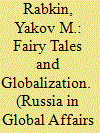

|
|
|
|
|
| Summary/Abstract |
Globalization, albeit no longer so global these days, affects children’s
values, self-images and world outlook through targeted marketing of
fairy tales, games and assorted media products. This article analyzes
these effects and proposes to those concerned a number of measures to
counteract them.
|
|
|
|
|
|
|
|
|
|
|
|
|
|
|
|
| 5 |
ID:
192488
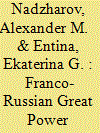

|
|
|
|
|
| Summary/Abstract |
The Franco-Russian great power rivalry is a powerful security dynamic
shaping the Sahara-Sahel region that was formed in the last decade due to transnational (in)security processes, namely, the transnational terrorism-
migration-crime nexus. The confrontation between Paris and Moscow,
which commenced at the end of last decade, is largely a consequence
of the weaknesses and inefficiency of the French foreign policy in the
region, which Russia strives to exploit to its political and economic benefit.
The hotspots of this confrontation are Libya and Mali, where the Franco-
Russian rivalry has led to the global securitization of the conflict (in both
countries), transformation of the regional balance of power (in Libya), and
the aggravation of existing security problems (in Mali). Overall, the Franco-
Russian rivalry in the Sahara-Sahel region is a phenomenon of the upcoming
age of multipolarity and a new Scramble for Africa.
|
|
|
|
|
|
|
|
|
|
|
|
|
|
|
|
| 6 |
ID:
192483


|
|
|
|
|
| Summary/Abstract |
A
s is traditional, the month of May in Russia is marked by the
broad celebrations commemorating the anniversary of the
Great Victory. The defeat of Nazi Germany—an achievement
to which our country made a decisive contribution, with the support
from our Allies—paved the way for the post-war international order,
with the UN Charter as its legal framework. The United Nations
Organization, an embodiment of true multilateralism, took on a central
coordinating role in global politics.
|
|
|
|
|
|
|
|
|
|
|
|
|
|
|
|
| 7 |
ID:
192481


|
|
|
|
|
| Summary/Abstract |
The article studies the diplomatic practice of building sustainable peaceful
relations in Europe. The authors conduct a comparative analysis of projects
intended to create pan-European forms of power, which at different times were proposed by European monarchs to ensure peaceful relations between
countries: Treaty on the Establishment of Peace throughout Christendom
by Bohemian King George of Poděbrady, the Grand Design by Henry IV,
and the Holy Alliance by Alexander I. Although similar to the European
monarchs’ initiatives in content and form, the Russian initiative implied
freer and more distributed institutional ties and rejected the idea of an
authorized pan-European body in favor of a broad association of European
monarchies. The concept of joint action, including non-expansionist
military intervention to preserve the natural process of social development
in Europe, was an important part of the Russian project. Anglo-Austro-
Russian team diplomacy, with the active peacemaking role of the Russian
emperor, succeeded in creating the first working pan-European order, and
the proposed institutions and principles ensured governable and peaceful
relations in Europe for almost a hundred years within the framework of the
Vienna system of international relations. Thus, instead of the unrealizable
idea of “perpetual peace,” the Austro-Russian tandem implemented the idea
of “perpetual struggle for peace,” but on diplomatic battlefields
|
|
|
|
|
|
|
|
|
|
|
|
|
|
|
|
| 8 |
ID:
192479


|
|
|
|
|
| Summary/Abstract |
The article analyzes “traditional values” through the lens of history,
philosophy, and political science in the context of the main social and
political processes within Western modernity. From such a perspective,
the notion of ‘traditional values’ comes as an important element of the
liberal-conservative approach characteristic of Western modernity as
opposed to the prevalent emancipatory approach. The history of relations
between the West and Russia shows that Russia has traditionally acted
as a “conservative balancer” in the system of international relations that
developed in the 19th century. At the end of the 20th century, following the
collapse of the USSR and the end of the Cold War, radical left-liberal elites
gained the upper hand in the West.
|
|
|
|
|
|
|
|
|
|
|
|
|
|
|
|
| 9 |
ID:
192482
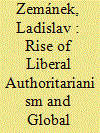

|
|
|
|
|
| Summary/Abstract |
The article deals with the transformation of the Western liberal democratic model
and international relations amid Cold War II. Sources of liberal authoritarianism
are identified, and the West’s ongoing authoritarian turn is conceptualized in
terms of postliberalism. The latter is scrutinized through the political West’s
efforts to protect liberal democracy and its values, and to establish global
Gemeinschaft of liberal democracies through containment, deterrence, and
encirclement. This process is seen as being interconnected with the intensifying
conflict between liberal and sovereign internationalism over the international
system. Whereas the political West asserts the rules-based order, the internally
heterogeneous Global Majority seeks to establish a polycentric model based
on the centrality of the UN Charter and the principles of peaceful coexistence.
Hegemonism is compared with the Global Majority’s emancipatory aspirations
that have led to the large-scale confrontation with the political West since 2022.
|
|
|
|
|
|
|
|
|
|
|
|
|
|
|
|
| 10 |
ID:
192484
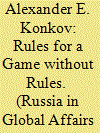

|
|
|
|
|
| Summary/Abstract |
The article analyzes the new Foreign Policy Concept (FPC) of the Russian
Federation. The provisions of the new FPC are compared both with the
previous versions of this document (adopted in 2013 and 2016) and
with the effective National Security Strategy. Structural, normative, and
strategic novelties are discussed. They are intended not only to determine
Russia’s foreign policy priorities in the changing world order, but also to
substantiate, ideologically and geopolitically, its commitment to these
priorities. It is noted that a clear statement of national interests, and
foreign policy goals and objectives provide a clearer and more logical
framework for Russia’s further actions in the international arena. However,
given the current international turbulence, this document all by itself will
not be enough to reflect all of the country’s needs and intentions in a
rapidly changing world.
|
|
|
|
|
|
|
|
|
|
|
|
|
|
|
|
| 11 |
ID:
192489


|
|
|
|
|
| Summary/Abstract |
The Indo-American strategic partnership is a long-term trend that
no one, including Russia, will be able to reverse. Russia must realize
that the Indian political elites are expanding their contacts with
the Americans not because of the “pressure from Washington,” but
because, in their opinion, cooperation with the U.S. is in New Delhi’s
national interests. At the same time, Moscow has the right to expect
New Delhi to show a similar attitude towards the Russian-Chinese
“relations of comprehensive partnership and strategic interaction
of a new era.”
|
|
|
|
|
|
|
|
|
|
|
|
|
|
|
|
| 12 |
ID:
192486
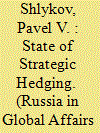

|
|
|
|
|
| Summary/Abstract |
This article analyzes the multidimensional nature of Turkey’s foreign
policy and its relations with Russia in the 2010s and the early 2020s
through the prism of strategic hedging concept. Previously, many scholars
pointed to mostly different elements of balancing in Ankara’s foreign
policy behavior. However, since the late 2010s, Turkey has systematically
positioned itself as a power aspiring for significant strategic autonomy
in international affairs, for which reason researchers had to look for new
analytical approaches to describe its behavior in the international arena and relations with its neighbors. The concept of strategic hedging allows
analyzing more accurately Turkey’s multidirectional foreign policy, which
does not correspond with the classical models of behavior typical of middle
powers, especially those engaged in military-political alliances with the
United States. The article argues that due to a complex of international
and domestic reasons Turkey has been trying to combine different types of
balancing and, more importantly, hedging. This strategy enables Turkey not
only to retain but also to enhance its strategic autonomy in international
relations. In this strategy Russia has become an important source of Turkey’s
strategic autonomy while the crisis in Ukraine, with all its negative impact
on Turkey, has opened up new opportunities.
|
|
|
|
|
|
|
|
|
|
|
|
|
|
|
|
| 13 |
ID:
192477


|
|
|
|
|
| Summary/Abstract |
International politics is becoming increasingly intricate. A couple of years ago, no one could have imagined that a top-level mission aspiring to resolve a severe
international conflict would go from Africa to Europe rather than vice
versa, and the whole world would watch representatives of African
countries urge the leaders of major
European countries to stop the
violence and begin negotiations.
|
|
|
|
|
|
|
|
|
|
|
|
|
|
|
|
|
|
|
|
|